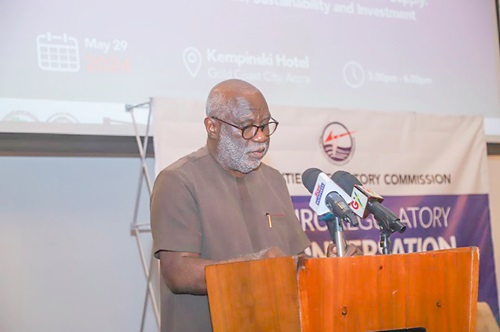
CWSA seeks Cabinet approval to become public utility
The Community Water and Sanitation Agency (CWSA) has started the process to transform from a social intervention service provider into a full-fledged public utility.
This will bring the CWSA under the regulatory supervision of the Public Utilities Regulatory Commission (PURC) just like the Ghana Water Limited (GWL) and the Electricity Company of Ghana Ltd (ECG) among others.
When the process is complete, the CWSA will be equipped with the capabilities to continue its original mandate of providing safe drinking water to rural and small towns but also manage the about 1,000 community-based water and sanitation related infrastructure and systems across the country for sustainability.
It is also expected to expand its mandate to cover boreholes, punch water sources and the over 1,500 private water suppliers currently operating without regulations to check their water quality and charges.
The regulation of community water services dominated discussions at the third Regulatory Conversation organised by the PURC in Accra last Wednesday (May 29).
On the theme: “Confronting the status quo of Ghana’s drinking water supply: Best practices in resilience, sustainability and investment”, the forum was aimed at directing collective focus towards a globally accepted fundamental human right.
The right to clean and reliable drinking water supply. Speakers included Manager in-charge of Water Coordination and Partnerships Division, AfDB, Jeanne-Astrid Ngako De Foki; Board Chairman, PURC, Ebo Quagrainie; Executive Secretary, PURC, Dr Ishmael Ackah, and other experts from the utilities.
A Director at the CWSA Head Office, Safuratu Muhammed Andani, in an interview with the Daily Graphic after the forum, stated that the CWSA was finalising a comprehensive document to be tabled before the Cabinet for approval on a process to transform the agency into a public utility.
“We have earlier on submitted our document to Cabinet and we were asked to revise some areas including self-supplying people who have boreholes in the communities. We are also to ascertain how to incorporate these self-services into our operations and return to the Cabinet. And, so we are currently finalising the document,” she said.
Ms Andani, an engineer, said the agency was established under an Act of Parliament (Act 564) in December 1998, with the mandate to facilitate the provision of safe drinking water and related sanitation services to rural communities and small towns.
She said in practice the agency over the years were only managing the donor funding and helping the districts assemblies to build infrastructure and hand it over to the communities.
However, she said several studies have established that there were challenges with regard to service provision as a result of frequent breakdown of nearly 30 per cent of the community water infrastructure.
“The reason for the breakdown is mostly because the volunteers being put in place to manage or maintain the facilities are not doing it properly and for that purpose the CWSA is pushing for these reforms to be able to engage professionals.
“With these professionals, once they are your employees you can hold them responsible to maintain the systems to generate revenue to support the operations of the CWSA.
“We have realised that with the dwindling of donor funding every soon if we are not careful all the systems would be down and we may not have money to rehabilitate them,” the director said.
PURC’s mandate
For his part, the PURC board chairman noted that the PURC was not currently mandated to regulate community water services. He said this distinction stems from the structural reforms of the nineties that divided the sector into urban and rural water, leading to the establishment of the agency to oversee the rural systems formerly managed by the erstwhile Ghana Water and Sewerage Corporation, now GWL.
![]()
Participants at the 3rd Regulatory Conversation
He said even though PURC’s water mandate is limited to urban areas, the Commission from its vantage position as the sole regulator of energy and water utility service has acquired deep insights into cross-cutting structural and operational bottlenecks that exist between urban and rural structures.
He said it was worth noting that despite significant progress in the water sector in Ghana, obstacles persist that impede universal access to safe drinking water.
“These circumstances have prompted us to question whether, after several years of implementing the aforementioned reforms, it is not time to reassess the situation,” he said.
Private investment
The AfDB Manager stated that Ghana’s water and sanitation sector could attract investments from the private sector to ensure sustainable development. She said after securing private investments there was the need to put in place deliberate measures to find the right balance between affordability and profitability.
Ms Foki added that countries such as Ghana could be inspired by what had worked for developed countries, not necessarily copying their style.
